Successful event management depends on many factors: the type of event, the organizer, and the sponsors involved. However, one key element is often overlooked—the tools used. Event management tools are critical to the success of any event. They help organizers coordinate and execute each phase of the event lifecycle, from event planning to post-event reporting. These solutions can transform chaos into clarity and help convert investment into measurable ROI. They also reduce the time spent on repetitive tasks, allowing organizers to focus on creating a standout attendee experience.
Choosing the right tools for your organization has become essential in a landscape where events must be flexible, attendees expect seamless experiences, and sponsors demand tangible ROI. This guide explains how event management tools streamline your event planning and execution, and outlines the best platforms available today.
- Event Management Tools Takeaways
- What Are Event Management Tools?
- Why You Should Use Event Management Tools
- How to Select Your Event Management Tools
- What Are the Main Event Management Features?
- The 15 Best Event Management Tools
- Conclusion: Streamline Your Event with the Best Event Management Solution
- FAQs

Event Management Tools Takeaways
- Event management tools provide a wide range of solutions to help organizers manage and execute their events more efficiently.
- These tools streamline all aspects of an event’s lifecycle: simplifying registration, check-ins, attendee engagement, event ROI, reporting, and more.
- Swapcard is a leading solution that simplifies event management and delivers actionable, data-driven insights.
What Are Event Management Tools?
Event management tools, also known as event management software, are digital platforms designed to help organizers plan, manage, and execute events more efficiently. They offer all-in-one solutions or dedicated software designed to support and automate specific tasks, workflows, or interactions.
These platforms include features for every phase of event planning and execution: registration, ticketing, scheduling, marketing and promotion, check-ins, floor navigation, badge printing, attendee engagement, feedback collection, analytics, and more. Event management tools are suitable for any type of event—trade shows, conferences, associations, congresses, nonprofits—and any format, including virtual, hybrid, or in-person.
Why You Should Use Event Management Tools
Event management tools help streamline your processes and increase your chances of a successful event. That is why 85% of event planners rely on them. These tools help you:
Centralize and reduce friction
Event software offers a single system for your team, eliminating the need to juggle multiple platforms or rely on endless email chains. This improves coordination, communication, and overall productivity.
Improve efficiency and automation
Event management tools automate repetitive or time-consuming tasks. They can personalize reminders, send follow-up emails, manage badge printing, and speed up check-ins. This reduces errors and enables your team to focus on high-value activities, such as managing speakers, exhibitors, or sponsors.
Enhance the attendee experience
A tool like a mobile event app can significantly improve the attendee journey, from seamless check-in and personalized agendas to networking and matchmaking functionalities, intuitive navigation, chats and Q&A, and access to exclusive content.
Boost exhibitor and sponsor ROI
Online event management tools enhance lead capture, promotion, meeting scheduling, and analytics—helping to increase event ROI and improve exhibitor and sponsor satisfaction.
Capture accurate data and insights
Event tools provide real-time and post-event analytics on metrics like web traffic, registrations, onsite check-ins, engagement, and conversions. These insights help you measure success and plan future events more effectively.

How to Select Your Event Management Tools
The best event management tools are those that match the type of events you run and offer the features you need from the start. When evaluating event management software, make sure the solution you choose is:
- Suitable: Choose software that matches the type of events you run. While some platforms support a wide range of formats, others are more specialized. If you organize trade shows, B2B conferences, nonprofit events, or virtual events, select tools that are tailored to those specific needs.
- Easy to Use: The event management platform should be intuitive for everyone involved: your team, exhibitors, speakers, and attendees. Quick setup, user-friendly design, and a clean interface are essential aspects of the best event management software. Accessibility is also important, with the best platforms offering both a responsive website and a dedicated mobile event app.
- All-in-one platform: Using one all-in-one event management platform to handle tasks like ticketing, registration, check-ins, and badge printing can save time and simplify coordination. The best event management tools help you avoid switching between systems by bringing everything into one place.
- Integrable: If you already use tools like CRMs, email marketing platforms, or CMS systems, ensure your event tool integrates seamlessly with them. Swapcard, for instance, enables over 30 native integrations with the most popular software, including Zapier, Map Your Show, Swoogo, Salesforce, Stova, Cvent, Captello, and more.
- Reliable: Reliability matters. A crash during the event can impact the attendees' experience and damage your reputation. A robust and reliable platform ensures a smooth execution from start to finish, keeping your team, partners, and attendees satisfied.
- Responsive: Responsive support makes all the difference when issues arise before or during your event. Quick and effective customer support helps resolve problems fast and ensures your event stays on track.
- Secure: Security is central to protecting your organization, sponsors, exhibitors, and attendees. Your management tool should offer robust encryption, protect all personal and payment data, and comply with up-to-date local regulations.
What Are the Main Event Management Features?
Event management software includes key features that help streamline planning, engagement, and measurement across the event lifecycle:
- Registration and ticketing: Create seamless event registration experiences with custom forms, multiple ticket types, secure payments, promo codes, and order management.
- Check-in and badge printing: Enable smooth entry with self check-in, badge printing, QR code scanning, and access control.
- Event mobile app: Offer a branded, white labeled app with floor plans, personalized agendas, push notifications, gamification, and live polls & Q&A.
- Networking & Matchmaking: Help attendees make quality connections through intelligent matchmaking suggestions, manual and AI-driven meeting requests, and connection rules.
- Event marketing: Automate email campaigns, send targeted messages, promote via social media, and recover drop-offs with in-app messaging.
- Lead capture: Improve lead conversion with lead qualification, lead export, booth selection, and exhibitors and event sponsors tools.
- Event monetization: Generate new revenue streams through homepage ads, sponsored content, exhibitor showcases, and marketplaces.
- Event analytics: Gain actionable insights with real-time data on registrations, engagement, lead generation, conversions, and exhibitor ROI.
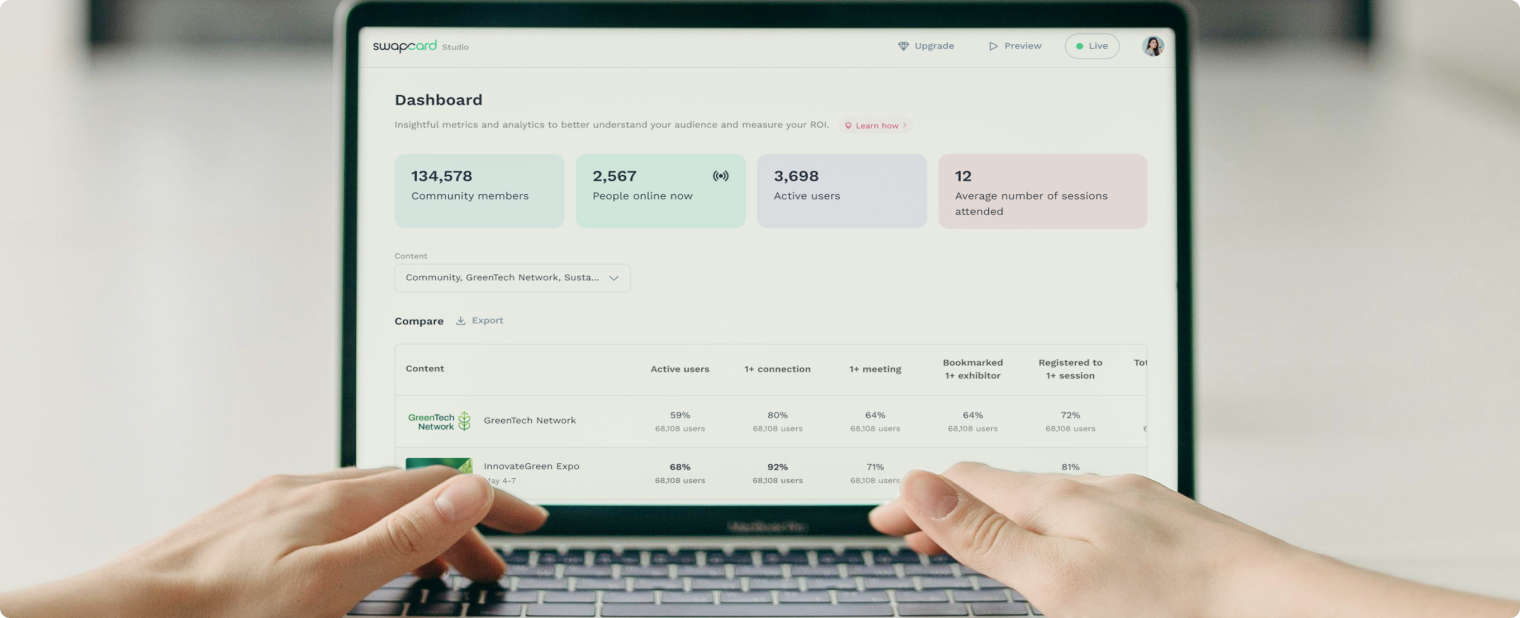
The 15 Best Event Management Tools
Discover the fifteen best event management tools to streamline your processes, boost engagement, and drive measurable results:
- Swapcard
- Whova
- Cvent
- Stova
- Grip
- ExpoPlatform
- InEvent
- b2Match
- Webex Events (Formerly Socio)
- Bizzabo
- EventsAir
- SpotMe
- vFairs
- EventMobi
- Eventbase
1. Swapcard
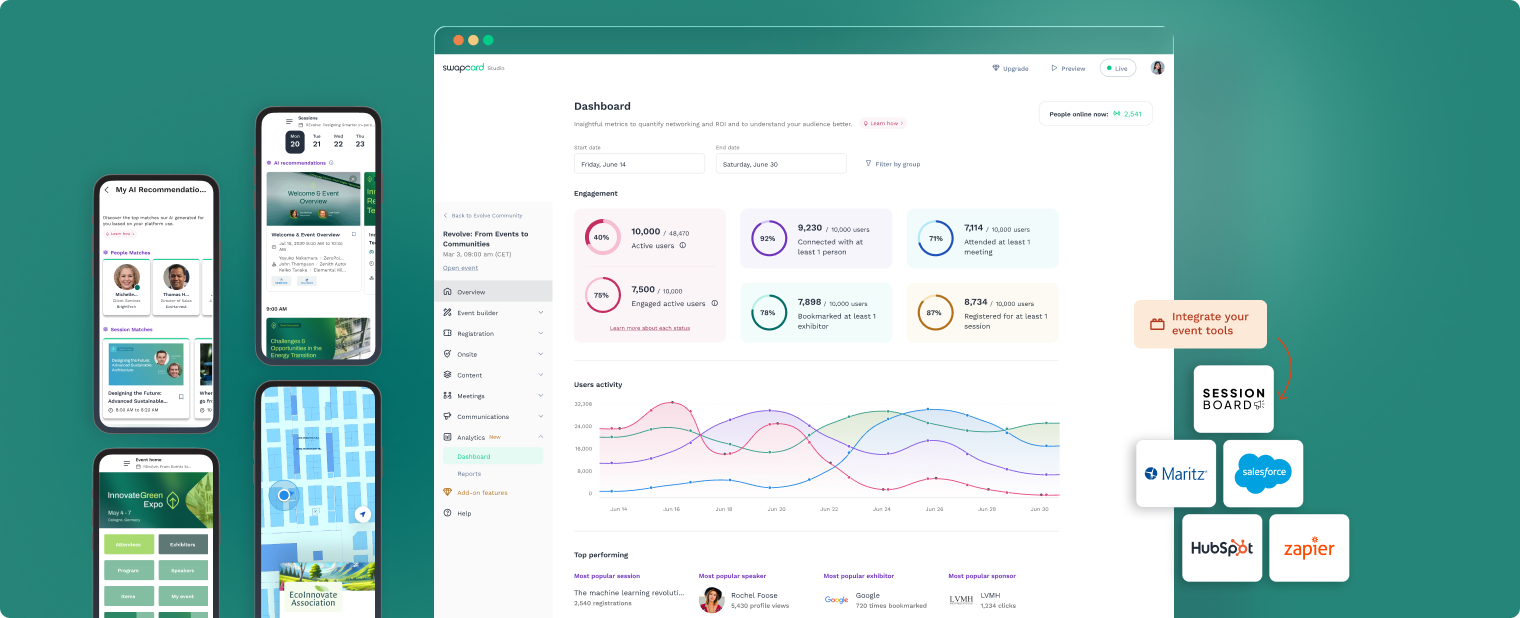
G2 Ratings: 4.6/5 (197)
Pricing: Starting from $560/year
Key takeaways: Swapcard is an AI-powered event engagement platform built to help organizers deliver personalized, data-driven experiences at scale. Designed for trade shows, conferences, and associations, it supports the entire event lifecycle—from registration and ticketing to mobile apps, onsite check-in, and post-event analytics.
Its AI-driven recommendations connect attendees, exhibitors, and sessions based on shared interests, while tools like custom registration workflows, lead capture, and ROI tracking help organizers and sponsors measure real impact. Ideal for organizers managing medium to large events. Swapcard helps boost engagement, simplify logistics, and deliver actionable insights—all within a single, integrated platform.
Schedule a live demo today.
2. Whova
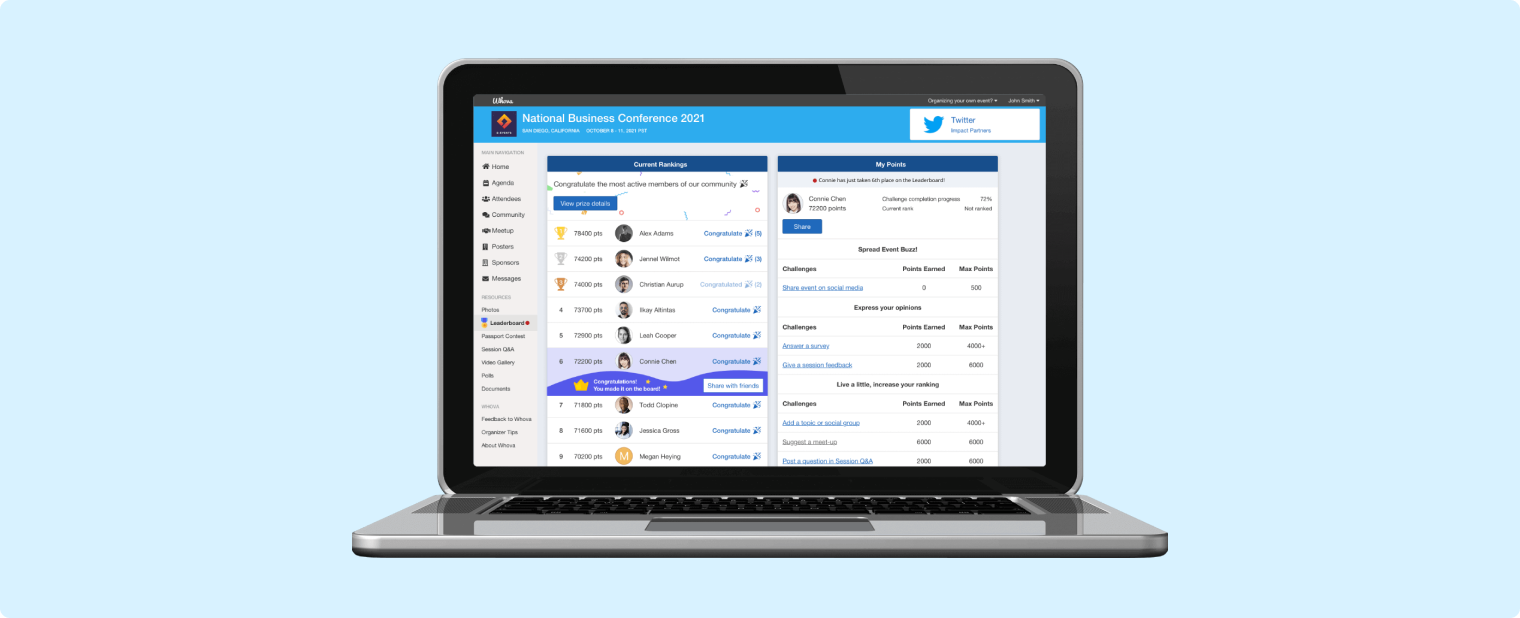
G2 Ratings: 4.8/5 (1179)
Pricing: Available upon request
Key takeaways: Whova is a popular event management and networking platform designed for organizers who need a simple, ready-to-use solution for managing registration, agendas, and attendee engagement. It is best known for its intuitive app, which keeps attendees connected through in-app messaging, community boards, and live polls.
Whova works well for in-person events, making it a flexible option for smaller or less complex gatherings. This event management tool stands out for its ease of use and quick implementation, though some organizers find it less scalable for large or highly customized experiences.
3. Cvent
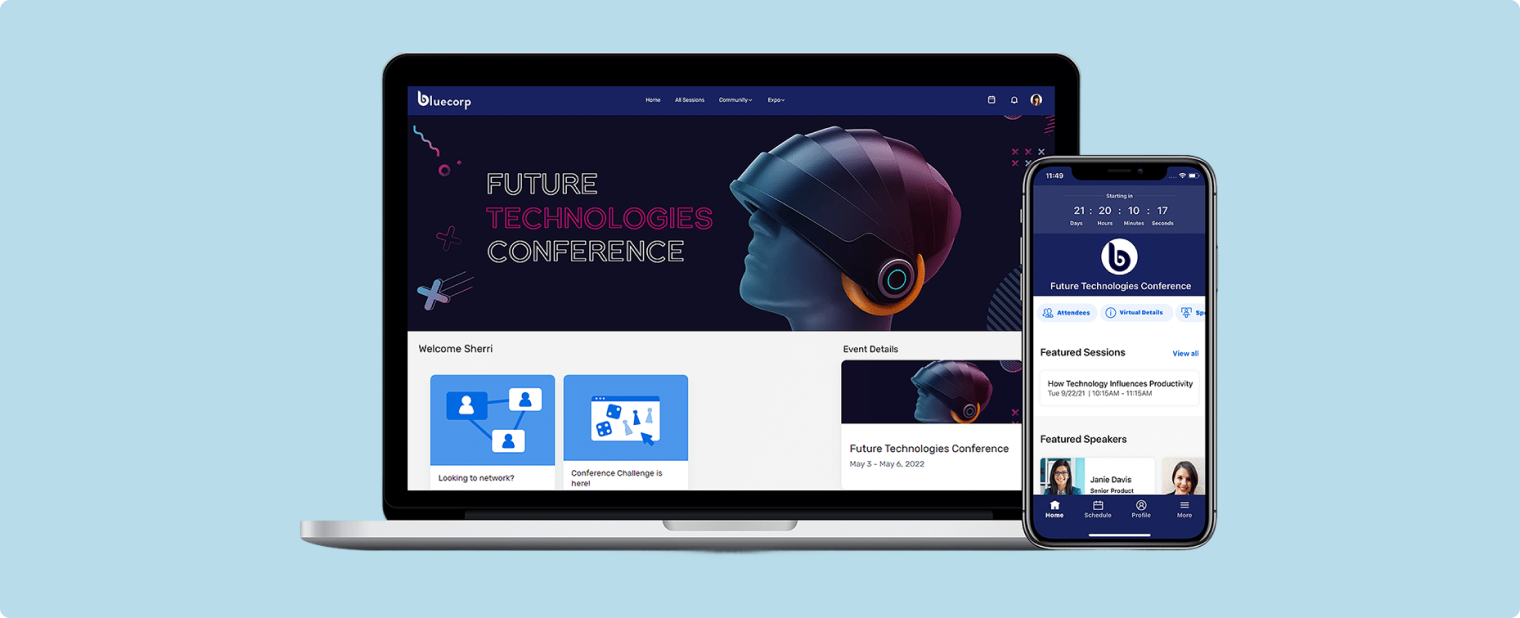
G2 Ratings: 4.3/5 (2135)
Pricing: Available upon request
Key takeaways: Cvent is one of the most established event management platforms, offering a suite of tools for registration, website creation, venue sourcing, onsite check-in, and reporting. Its strong integrations with CRMs and marketing systems make it a top choice for corporate events.
Built with enterprise reliability in mind, Cvent is best suited for mid-sized to large organizations looking for a comprehensive solution and willing to invest in premium capabilities.
4. Stova
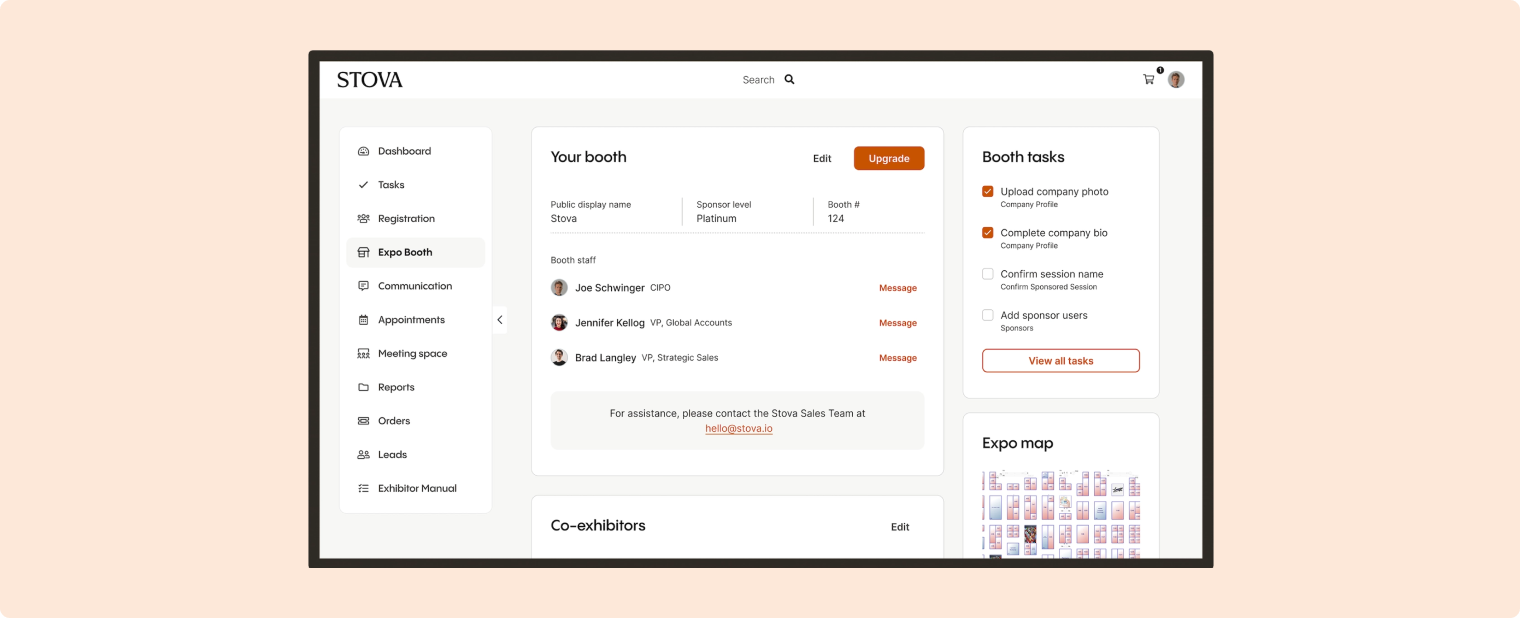
G2 Ratings: 4.2/5 (198)
Pricing: Available upon request
Key takeaways: Stova is a comprehensive event management tool formed from the merger of MeetingPlay, Aventri, and EventCore. With Stova, you can handle everything from registration and attendee management to branded apps, onsite check-in, networking, and reporting.
Stova is ideal for organizers running mid to large-scale events who need an enterprise-ready solution. Its wide range of advanced features offers flexibility and control; however, teams should be prepared for a steeper learning curve during the initial setup.
5. Grip
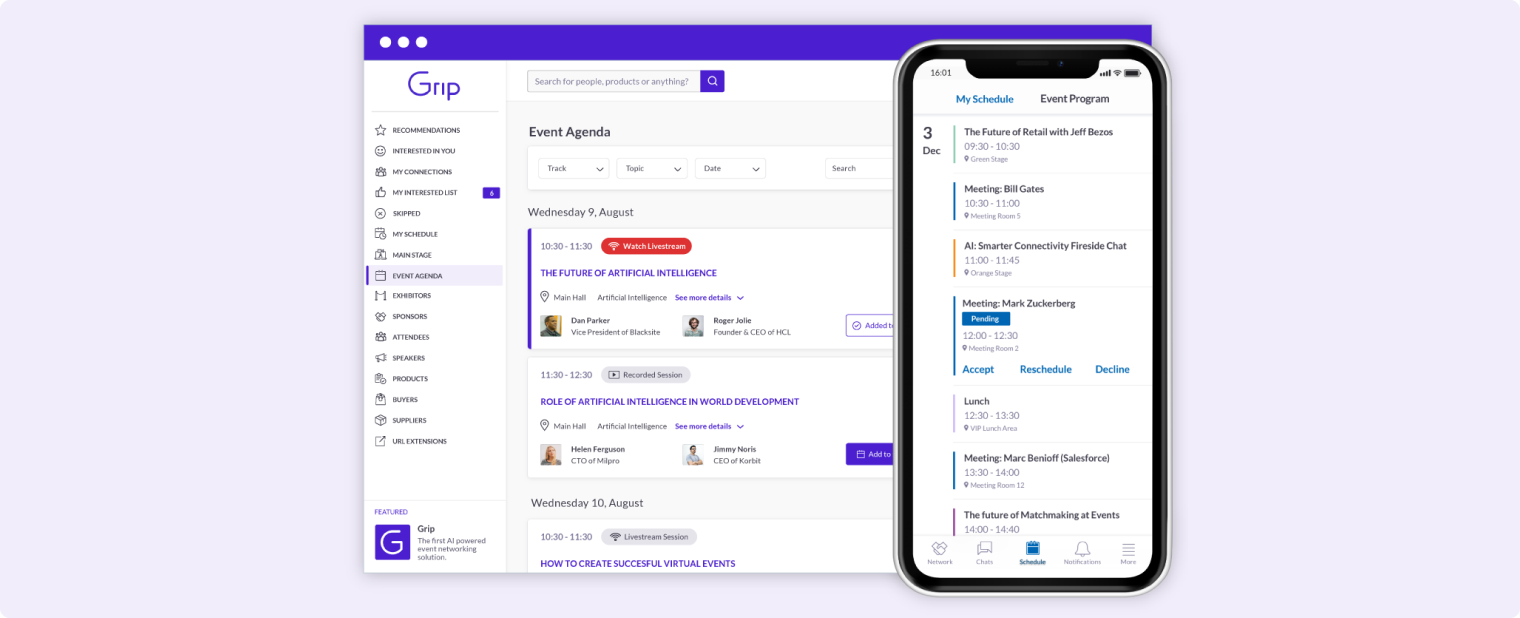
G2 Ratings: 4.6/5 (15)
Pricing: Available upon request
Key takeaways: Grip is an AI-powered platform designed to strengthen business relationships and streamline event matchmaking. In addition to networking, it includes tools for registration, exhibitor management, lead retrieval, and analytics to track engagement and ROI. Designed primarily for large B2B trade shows and conferences, Grip helps organizers connect attendees, exhibitors, and buyers through personalized recommendations.
Its focus on matchmaking makes it an excellent choice for connection-driven events. Grip delivers strong networking capabilities but is most effective for organizers who prioritize meetings and matchmaking above broader event management needs.
6. ExpoPlatform

G2 Ratings: 4.5/5 (3)
Pricing: Available upon request
Key takeaways: ExpoPlatform is an online event management tool built for large-scale exhibitions and trade shows. It offers tools for registration, exhibitor management, AI-powered matchmaking, sponsorships, and event apps. Organizers can manage exhibitor profiles, schedule meetings, and track engagement, all while accessing detailed analytics to measure performance and ROI.
With advanced customization options and hybrid-ready features, ExpoPlatform is best suited for experienced teams managing complex, enterprise-level events.
7. InEvent
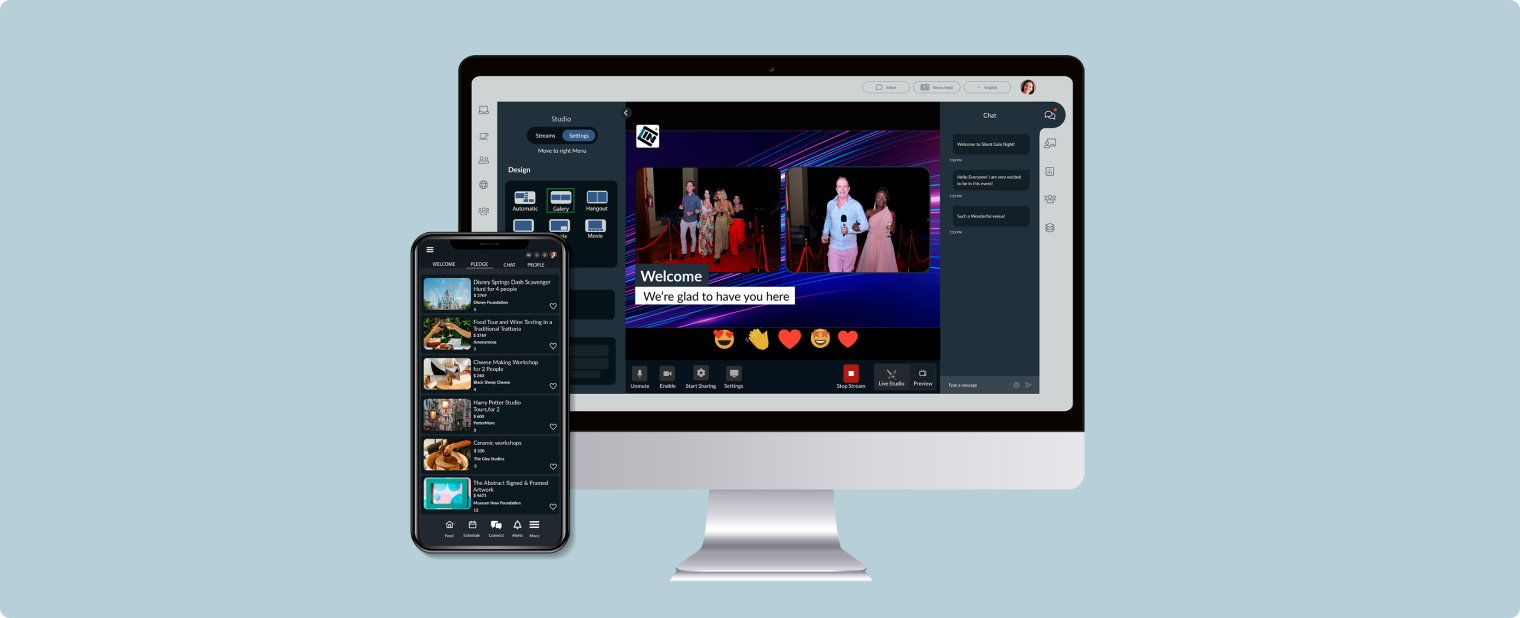
G2 Ratings: 4.5/5 (143)
Pricing: Available upon request
Key takeaways: InEvent is a flexible, all-in-one event management platform that gives organizers full control to customize every aspect of the event experience. Known for its white label capabilities and production-quality streaming, it includes tools for registration, live streaming, attendee engagement, and analytics, all within a fully brandable interface.
InEvent is a strong choice for larger or multi-track conferences that require advanced branding and broadcast-level production. While it offers deep customization and dedicated support, its configuration options can require more time and technical setup.
8. b2Match
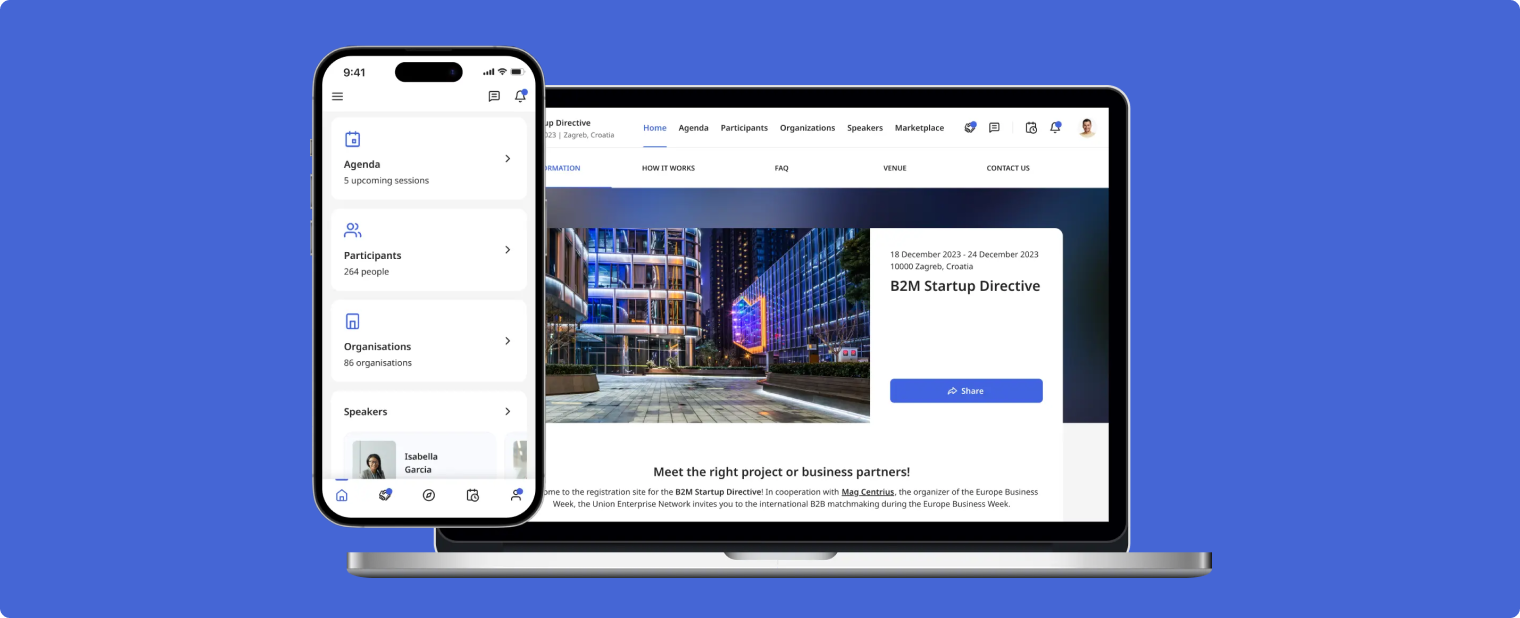
G2 Ratings: 4.8/5 (6)
Pricing: Starting from $812/year
Key takeaways: b2match is an all‑in‑one event management platform built for B2B networking and matchmaking. It offers tools for custom registration, agenda building, payment management, real‑time meeting scheduling, AI‑powered matchmaking, and community engagement.
b2match is best suited for business and networking-focused events like trade fairs or partnership meetups, where building meaningful connections is the top priority. Though it performs well for connection-driven formats, it may be less ideal for large-scale, hybrid, or highly customized event experiences.
9. Webex Events (formerly Socio)

G2 Ratings: 4.6/5 (1061)
Pricing: Available upon request
Key takeaways: Webex Events is a flexible event platform. It covers registration, branded apps, live streaming, networking tools, onsite check-in, badge printing, and data-rich analytics to measure engagement and ROI. Its main strength lies in its ability to scale seamlessly, supporting from internal meetings to large global conferences within the broader Cisco Webex ecosystem.
This solution is best suited for enterprise clients running large-scale, data-driven events that require advanced customization and integrations.
10. Bizzabo
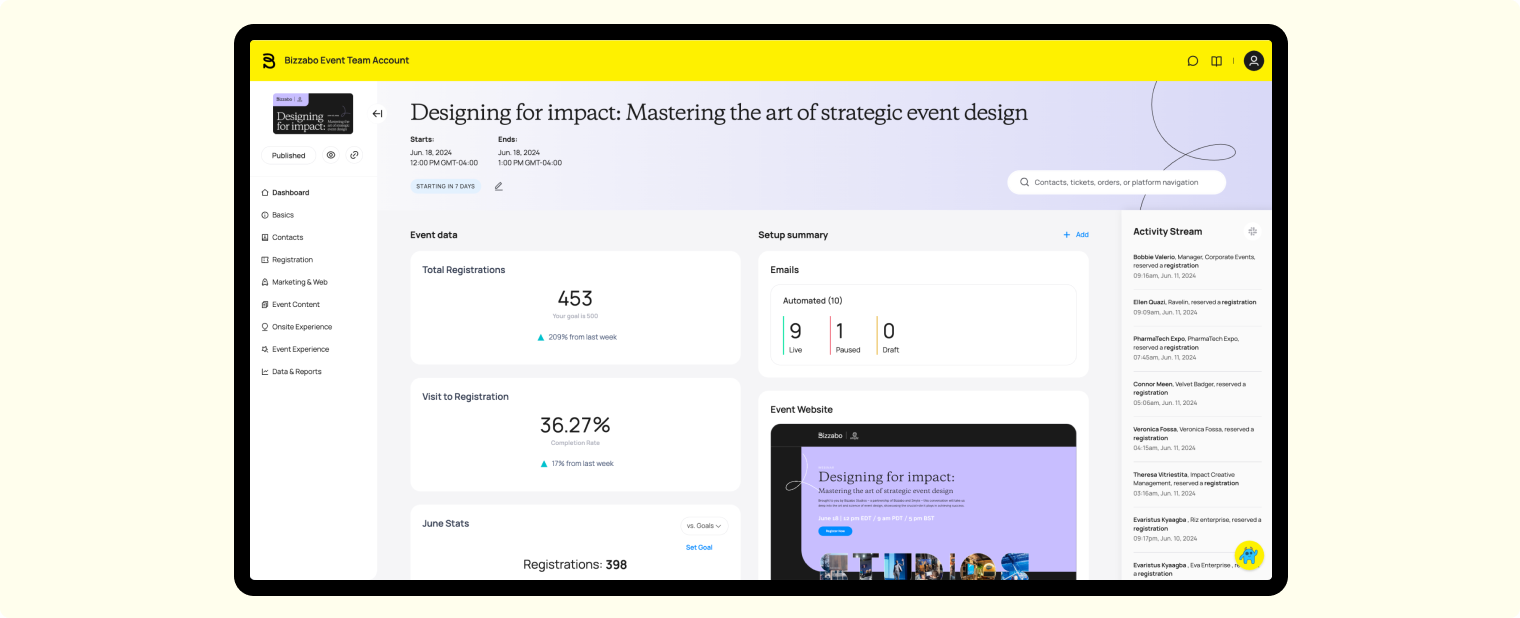
G2 Ratings: 4.3/5 (370)
Pricing: Starting from $17,999/year
Key takeaways: Bizzabo is an event management platform with a strong focus on attendee experience, branding, and data-driven insights. The platform enables organizers to create a branded website and mobile app, manage registration and ticketing, facilitate networking and matchmaking, and track performance through analytics.
Ideal for large or recurring events, Bizzabo offers deep integration options with CRMs and marketing tools, along with automation features that save time and maintain consistency.
11. EventsAir
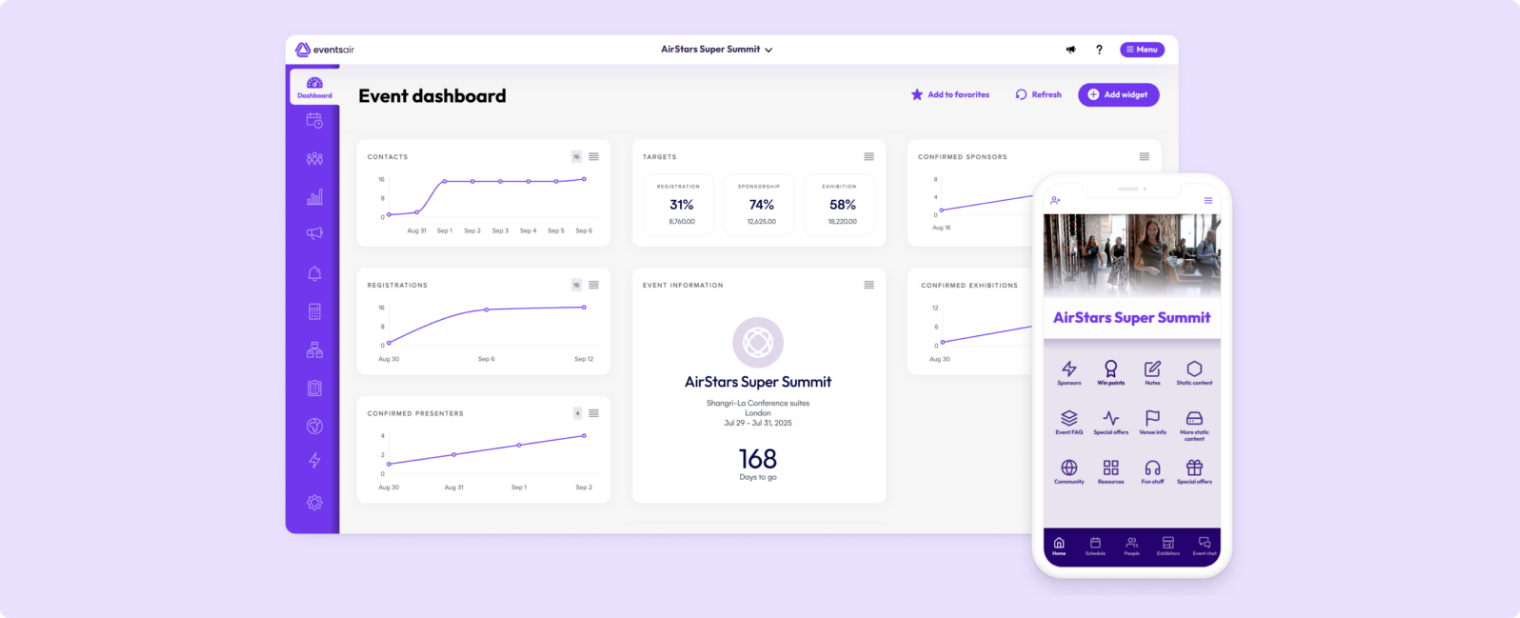
G2 Ratings: 4.5/5 (46)
Pricing: Available upon request
Key takeaways: EventsAir is an event management platform built to manage every aspect of an event—from registration and ticketing to mobile apps, and hybrid streaming. It offers tools for attendee engagement, sponsor and exhibitor management, and reporting.
With decades of industry experience, EventsAir is designed for large-scale conferences and hybrid events that require reliability and flexibility. While it excels in operational depth, its feature-rich interface can be more complex to master.
12. SpotMe
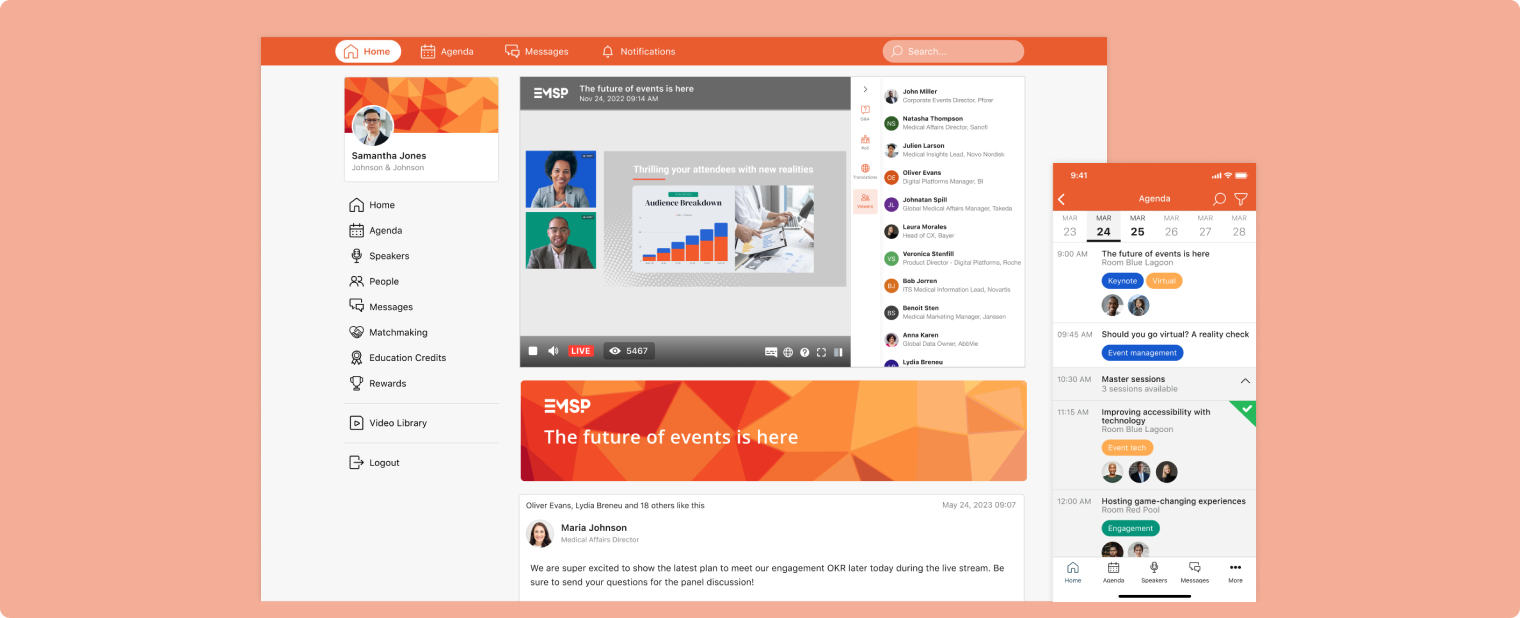
G2 Ratings: 4.7/5 (198)
Pricing: Available upon request
Key takeaways: SpotMe is an event platform designed to create highly interactive experiences. It brings together tools for registration, live streaming, branded mobile and web apps, and audience engagement features like polls, Q&A, and chat. Organizers can access detailed analytics and CRM integrations.
SpotMe is best suited for enterprise events that prioritize personalization, data insights, and consistent branding across large audiences.
13. vFairs

G2 Ratings: 4.7/5 (1740)
Pricing: Available upon request
Key takeaways: vFairs is a versatile event platform recognized for its immersive 3D-style environments and virtual booths, which make online experiences visually engaging. It also includes tools for registration, networking, webinars, and analytics to track attendee participation and ROI.
vFairs is a strong choice for trade shows, job fairs, and large virtual events that focus on connecting exhibitors and attendees across formats. However, its emphasis on 3D visuals and managed setups may make it less flexible for teams seeking a simpler, self-service experience.
14. EventMobi

G2 Ratings: 4.6/5 (247)
Pricing: Starting from $8,900/year
Key takeaways: EventMobi is an event management platform designed for mid-sized conferences, corporate meetings, and association events that value simplicity, branding, and engagement. It offers an intuitive setup with tools for registration, branded event apps, live polls, Q&A, and post-event analytics, helping organizers create interactive and engaging experiences.
A great fit for small to mid-sized teams, EventMobi delivers a smooth balance of ease, design, and interactivity, best suited for events that don’t require complex customization or enterprise-level integrations.
15. Eventbase
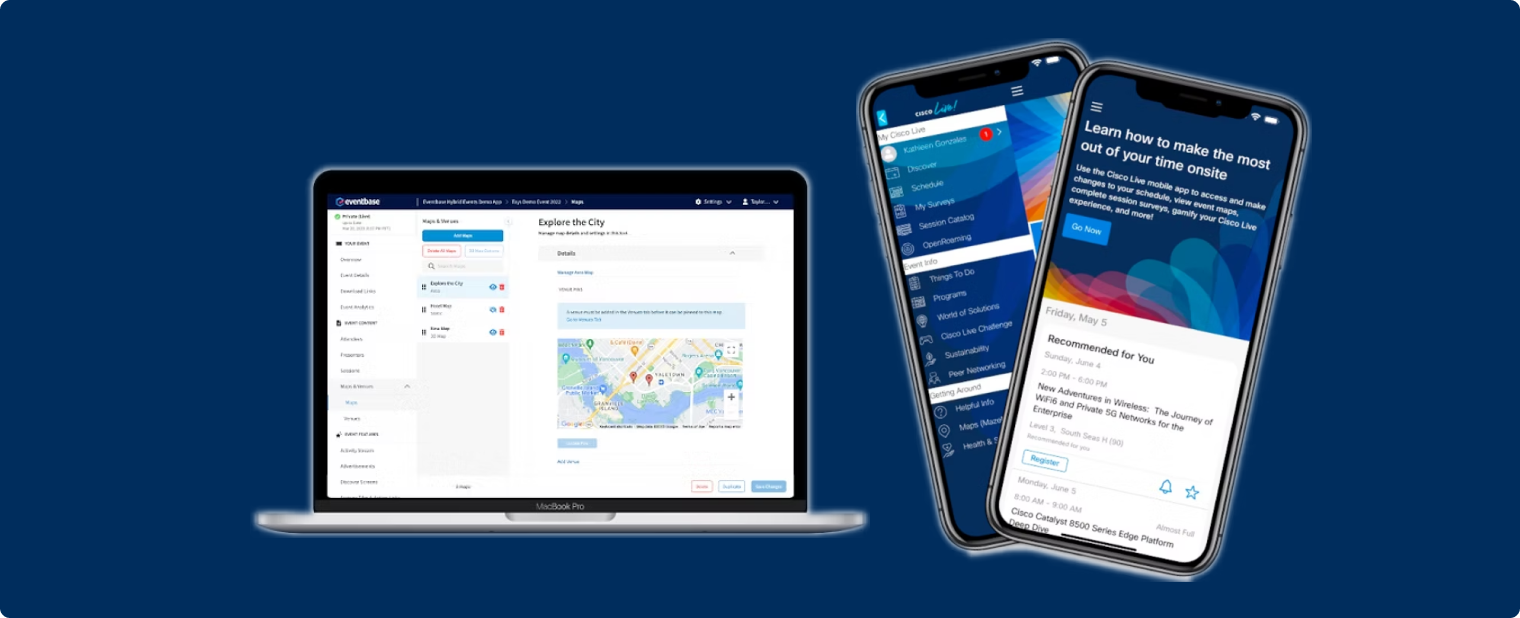
G2 Ratings: 4.8/5 (17)
Pricing: Available upon request
Key takeaways: Eventbase is a premium event app platform designed for large conferences and enterprise-level events that require a robust mobile presence and comprehensive branding control. It focuses on delivering custom, white labeled apps that enhance attendee engagement through personalized schedules, navigation, and interactive features.
Eventbase excels at creating polished, app-driven experiences for complex, large-scale events. While it offers extensive customization and enterprise reliability, its mobile-first, bespoke approach makes it best suited for organizations running flagship or high-profile events rather than smaller teams seeking a ready-to-launch solution.
Conclusion: Streamline Your Event with the Best Event Management Solution
The right event management software can turn your event into a smooth, successful, and unforgettable experience. Depending on your goals—whether budget, branding, scalability, or attendee engagement—a strong event platform supports every aspect of your event. If you want to ensure smooth execution while managing every stakeholder, choose Swapcard, the go-to solution for event professionals, supporting every stage of your event and driving more successful and profitable outcomes.
Frequently asked questions about event management tools
Who should use event management tools?
Any organizer managing events with multiple stakeholders, large audiences, or hybrid formats can benefit from using event management tools. They are especially valuable for trade shows, conferences, summits, corporate meetings, and community events where efficiency, engagement, and data tracking are priorities.
How much do event management tools cost?
Event management tools pricing depends on the platform and scale. Some solutions charge per registration or ticket, while others offer annual licenses. Most event management software provides various packages tailored to the needs and goals of event planners.
Are there free event management tools?
Yes, some event management platforms offer free plans that are useful for small events or for testing the software before committing. These plans typically include basic features and come with limitations, such as limited attendee capacity, missing key features, restricted branding options, basic support, and fewer available integrations.
Join 12,000 subscribers and unlock industry secrets.
By submitting this form, you agree to receive periodic emails on insightful content related to events and our product, and in accordance with our Privacy Policy. You can, of course, change your preferences or unsubscribe at any time.





.avif)

.svg)


.svg)
.svg)
.svg)





